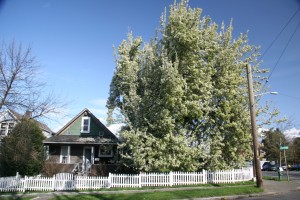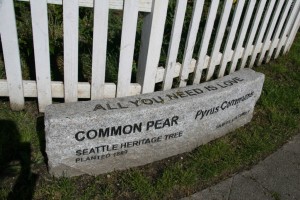“All You Need Is Love”
I love old houses, cottages especially, that link the street to another time. So much the better if they have not been rehabilitated. There they stand, in all their glory, proudly showing their scars. There is one such cottage at the end of our street, on the corner of 27th and East Cherry in Seattle’s Central District; and it is beyond glorious, not just on account of itself, but because of the tree it is connected to. You can read more about this tree at http://seattletimes.nwsource.com/html/localnews/2008946386_peartree30m.html.
The huge tree is a common pear, pyrus communis, planted in 1889. It dwarfs the house it watches over, and like other city trees it has witnessed more action and tragedy in one century than the sequoias have in five.
A little more than a year ago, a young Seattle man, Tyrone Love, was gunned down in the next block, and his murder remains unsolved. You can read about this tragedy under the heading “Young Guns, Stolen Lives” at http://www.sableverity.com/2010Project/1-year-the-murder-of-seattles-own-tyrone-love/.
A plaque has been installed, giving the year the tree was planted alongside its Latin name. Across the top of the plaque are the words, “All You Need is Love,” timeless wisdom in recognition of how pear trees grow and in tribute to Tyrone.



Recent Comments